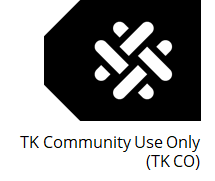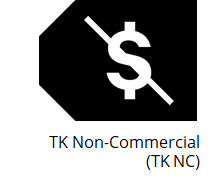2.3 Legal and Ethical Considerations
Here are some legal and ethical issues you might consider before you archive your materials.
- Have you considered the wishes of any governing body in the language community? Even if you are a member of the community, you will probably want to share your plans with someone in authority. That consultation will show respect, alert the community to this exciting advancement of resources for the language, and give community voices an opportunity to contribute their opinions. Perhaps they will want to add their own materials as well!
- It is important to know that when you archive with CoRSAL you will retain copyright of the materials. CoRSAL and UNT will have no rights to commercial use of the materials, so they can't turn around and sell the materials to someone else. But you must also know that the materials will be freely available to the public for personal and research uses.
- There may be some items that are sensitive or that you are just not ready for the world to see. You can use the access restrictions in the digital library to prevent universal access. Discuss these access restrictions with the CoRSAL archivist. If you are still not comfortable with housing that particular item or set of items in the archive, you may omit them from your deposit. You can also make use of traditional knowledge labels to indicate the cultural significance of an item in a deposit. We give examples of labels at the end of this section.
- Another consideration is attribution. Who was responsible for the creation of the collection? How about for the individual items? CoRSAL encourages acknowledging all the core people responsible for creating and contributing to an item.
- How about materials that were not born digital, but need to be digitized? These are often books or pamphlets that were printed several years ago and in limited print runs. How will you get permission to archive these?
Discuss with your archivist different scenarios where linguistic information from your deposit may be reused for academic or other work.
Open Access
In South Asia, the concept of open access archives for linguistics is fairly new. There is doubt that surrounds the move to make materials freely available.
- What if a researcher scoops up these materials and creates a magnificent new analysis that makes her rich and famous? This is not likely to happen.
- What if someone takes all the folktales in the deposit and makes a children's book out of them without consulting the community, depositor, or archive? If that children's book has commercial value, if it is going to be sold and the the author makes money off of the book, then that person has gone against the rules of archive. They are violating copyright rules and can be litigated in court to stop them from selling, or even distributing that book. Again, it is unlikely that this will happen, because the items on CoRSAL are all individual sound or video files. Transcriptions and translation are provided, but not usually in a format where they can simply be downloaded and published. Usually it would just be too much work for that hypothetical copyright violator! What we are expecting, then, is fair use of the material.
- What is meant by fair use? It means that copyrighted materials can be used for some limited intellectual purposes as per US Code Title 17, Sec. 107:
“[T]he fair use of a copyrighted work, including such use by reproduction, in copies or phonorecords or by any other means specified by that section, for purposes such as criticism, comment, news reporting, teaching (including multiple copies for classroom use), scholarship, or research, is not an infringement of copyright.”
So, the deposited materials can be used for teaching, for example, but not for making money.
Traditional Knowledge Labels
Traditional Knowledge Labels help translate traditional concepts into protocols for cultural knowledge sharing and use (Local Contexts, 2017). Using these Traditional Knowledge Labels conveys important information on how the knowledge you are sharing is viewed by the culture from which it originates. The labels can convey proper use, guidelines for action, and responsible stewardship (Local Contexts, 2017).
Traditional Knowledge labels can be viewed in more detail on the Local Contexts page, but here are some examples:

According to Local Contexts, this label conveys the following:
“This label is being used to indicate that this material is traditionally and usually not publicly available. The label is correcting a misunderstanding about the circulation options for this material and letting any users know that this material has specific conditions for circulation within the community. It is not, and never was, free, public and available for everyone at anytime. This label asks you to think about how you are going to use this material and to respect different cultural values and expectations about circulation and use.”

According to Local Contexts, this label conveys the following:
“This material has been designated as being available for non-commercial use. You are allowed to use this material for non-commercial purposes including for research, study or public presentation and/or online in blogs or non-commercial websites. This label asks you to think and act with fairness and responsibility towards this material and the original custodians.”
The CoRSAL archive does not have a systematic way of indicating these labels, but we can include this information for applicable items in the Notes field.
Avoiding Cultural Misappropriation
This is a term that has become more prevalent in social rights discussions over the past few decades. But what does it mean?
Appropriation is when you take something “that belongs to someone else for one’s own use” (Intellectual Property Issues in Cultural Heritage Project, 2015). Misappropriation is when your use is inappropriate and purely for your own benefit. Culture is not something that can be easily protected under copyright laws, and it is difficult for indigenous communities to seek legal aid in battling misuse of their culture. Cultural misappropriation is when another community's culture is used without their consent and for reasons that are inappropriate or not beneficial to the community in any way. Thankfully, there are ways to avoid this, adapted from the Intellectual Property Issues in Cultural Heritage project, 2015:
- Prior and informed consent: confirm that you have permission to use the cultural aspects in the way you are planning.
- Shared control and collaboration: work together with creators and community members to ensure they have equal control over the use and representation of their culture.
- Proper acknowledgment: ensure that proper acknowledgment is given to the original culture and community.
- Cultural respect: consider the beliefs, values, and practices of the original culture to ensure your use of the culture is in no way at odds.
- Sharing benefit: make sure the benefits of the final use is shared among all parties, including the original creators and cultural community.
We want archives users to respect concerns of misappropriation and hope that collection guides and other other reach will lead to the appropriate level of respect for culture and language freely shared. Simon Fraser University has a great guide on the issue, from which much of this content is inspired.
The bottom line is that these are your materials, and you should feel comfortable discussing issues of access, copyright, and appropriation with the archivist and deciding your comfort level in archiving your materials with CoRSAL or elsewhere.
References
Intellectual Property Issues in Cultural Heritage Project. (2015). Think Before You Appropriate. Things to know and questions to ask in order to avoid misappropriating Indigenous cultural heritage. Simon Fraser University: Vancouver. Retrieved from https://www.sfu.ca/ipinch/sites/default/files/resources/teaching_resources/think_before_you_appropriate_jan_2016.pdf.
Local Contexts. (2017). Background Brief on Local Contexts and the [Traditional Knowledge] TK Labels. Retrieved from http://localcontexts.mukurtu.org/wp-content/uploads/2016/12/Local-Contexts-Background-Brief.pdf
